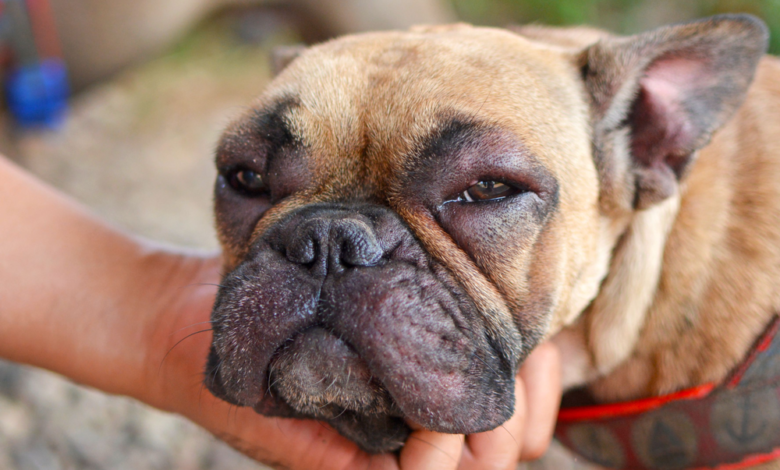
Heat Rash on Dogs: How to Recognize and Treat It
As pet owners, we strive to provide the best care and comfort for our beloved dogs. However, during hot weather conditions, dogs can be susceptible to various health issues, including heat rash. Understanding how to recognize and treat heat rash in dogs is crucial to ensure their well-being and prevent any discomfort they may experience. In this article, we will explore what heat rash on dogs is, its causes, symptoms, and effective treatment methods, as well as essential preventive measures to keep our furry companions cool and healthy.
Read More: Summer Pet Safety Checklist
What is Heat Rash on Dogs?
Heat rash, also known as “prickly heat,” is a skin condition that can affect dogs when they are exposed to high temperatures or humidity for prolonged periods. It commonly occurs in areas where the skin is covered by fur, making it challenging for the skin to breathe properly. Heat rash appears as small red bumps or blisters and can be uncomfortable for dogs.
Understanding the Causes of Heat Rash

Heat rash is primarily caused by the blockage of sweat glands in a dog’s skin. When dogs become overheated, they sweat to regulate their body temperature. However, in humid conditions, their sweat glands can become clogged, leading to the development of heat rash. Breeds with thick fur and dogs who are overweight are more prone to this condition.
Recognizing the Symptoms of Heat Rash
To identify heat rash in your dog, watch out for the following symptoms:
- Red Bumps or Small Blisters: Heat rash usually appears as red, inflamed bumps or small blisters on the skin, particularly in areas with thick fur.
- Excessive Itching: Dogs with heat rash may scratch or lick the affected areas frequently due to discomfort.
- Hot and Painful Skin: The skin around the rash may feel hot to the touch and cause your dog some pain.
- Restlessness: Dogs with heat rash may exhibit signs of restlessness or discomfort, especially in hot weather.
Preventive Measures for Heat Rash
Preventing heat rash is essential to keep your dog comfortable and healthy during hot seasons. Here are some preventive measures you can take:
- Provide Ample Water: Always ensure that your dog has access to fresh water to stay hydrated, especially on hot days.
- Limit Exercise in Heat: Avoid rigorous exercise during peak hours of the day when the temperatures are at their highest.
- Provide Shade: Create shaded areas in your yard or outdoor space so that your dog can rest comfortably without direct sun exposure.
- Avoid Hot Surfaces: Refrain from walking your dog on hot pavements or surfaces that can contribute to overheating.
- Grooming: Regularly groom your dog to remove excess fur, promoting better air circulation and reducing the risk of heat rash.
How to Provide Relief to Your Dog
If you suspect your dog has heat rash, there are several ways to provide immediate relief:
- Cool Compress: Apply a cool, damp cloth to the affected areas to soothe the skin.
- Keep Indoors: Bring your dog indoors and into a cooler environment to prevent further heat exposure.
- Avoid Irritants: Ensure your dog avoids any potential irritants that can worsen the rash, such as rough fabrics or grassy areas.
Treating Heat Rash in Dogs

In most cases, heat rash in dogs can resolve on its own once the dog is removed from the hot environment. However, if the rash persists or worsens, consult your veterinarian for appropriate treatment. The veterinarian may recommend:
- Topical Ointments: Prescription ointments can be applied to alleviate inflammation and itching.
- Medicated Shampoos: Specialized shampoos can help cleanse the affected area and promote healing.
- Antibiotics: In severe cases of heat rash, oral antibiotics may be prescribed to prevent infection.
Home Remedies for Heat Rash
While it’s essential to consult your veterinarian, there are some home remedies that can complement professional treatment:
- Aloe Vera Gel: Aloe vera has soothing properties that can help reduce inflammation and provide relief to your dog’s skin.
- Oatmeal Baths: An oatmeal bath can soothe itchy skin and help alleviate discomfort.
- Coconut Oil: Coconut oil has natural antibacterial properties and can be applied topically to promote healing.
When to Seek Veterinary Care

In most cases, heat rash can be managed with proper care and attention. However, you should seek veterinary care if:
- The Rash Persists: If the heat rash does not improve within a couple of days, consult your veterinarian for a thorough examination.
- Signs of Infection: If you notice signs of infection, such as pus or excessive redness, seek immediate veterinary care.
- Behavioral Changes: If your dog’s behavior changes drastically, such as loss of appetite or lethargy, it may indicate a more severe problem.
- Preexisting Health Conditions: Dogs with preexisting health conditions may be more susceptible to complications from heat rash. In such cases, professional care is vital.
Read More: Loving and Living with Old Dogs
FAQ’s
- Can heat rash be contagious between dogs? Heat rash is not contagious and cannot be passed between dogs.
- Is heat rash preventable with regular grooming? Regular grooming can help reduce the risk of heat rash by promoting better air circulation through the coat.
- Can I use over-the-counter creams on my dog’s heat rash? It is best to avoid using over-the-counter creams without veterinary advice, as some ingredients may be harmful to dogs.
- Are certain dog breeds more prone to heat rash? Yes, breeds with thick fur or brachycephalic (flat-faced) breeds may be more susceptible to heat rash.
- Can I bathe my dog during a heat rash outbreak? While baths can provide some relief, avoid using very cold water, as it may shock your dog’s system. Stick to cool or lukewarm water.
Conclusion
Heat rash is a common concern for dog owners, especially during hot weather. By understanding the causes, symptoms, and preventive measures, we can protect our furry companions from this uncomfortable condition. If your dog does experience a heat rash, providing immediate relief and appropriate treatment, if necessary, can aid in their recovery. Always prioritize your dog’s well-being, and with proper care, they can enjoy a happy and healthy life, even in the heat.








One Comment